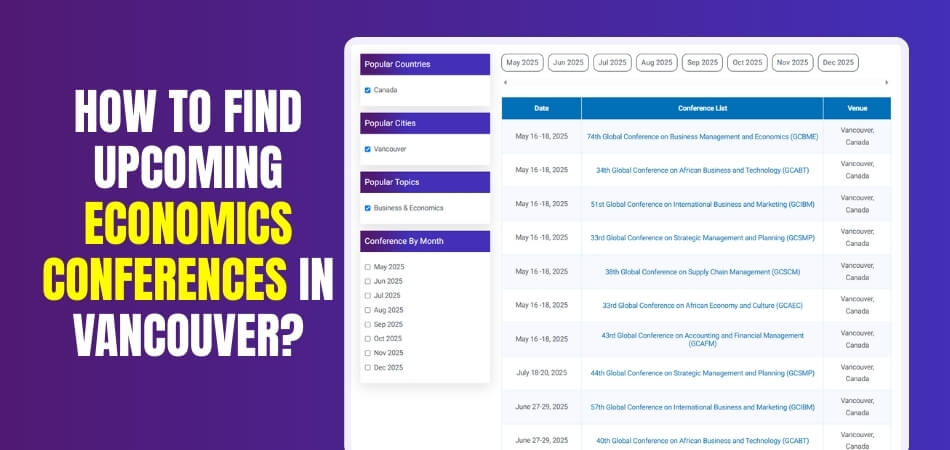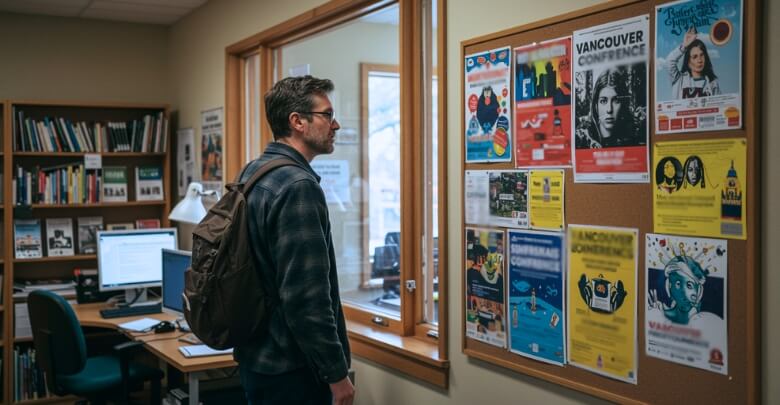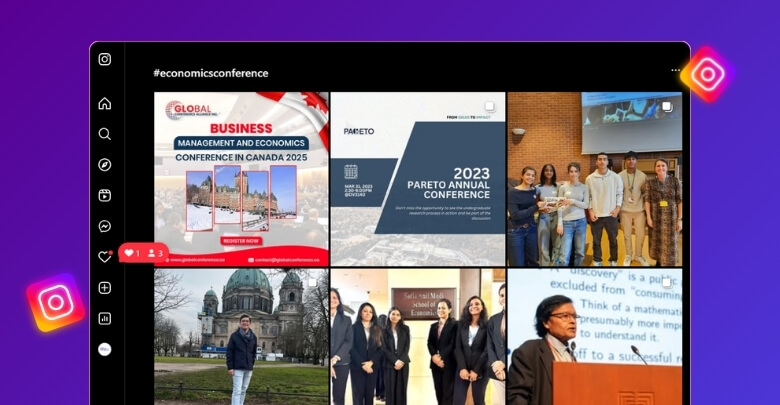Vancouver’s economic conferences offer professionals and academics a wonderful opportunity to exchange ideas, learn from each other, and share insights. As the field changes, staying updated with upcoming events is essential. This raises the question: “How to find upcoming economics conferences in Vancouver?
To find these events, explore university websites, professional organizations, and event platforms like Global Conference Alliance Inc. and Eventbrite. Social media accounts dedicated to economics, LinkedIn groups, and newsletters are also excellent resources for staying informed. These channels will keep you updated on the latest conferences and seminars in the city.
Continuing to read the following section of this article will give you an idea of how you can plan and track economics conferences in Vancouver in an easy way. So stay with us.
How to Find Upcoming Economics Conferences in Vancouver? Quick & Easy Methods
Vancouver often hosts interesting economics conferences where people talk about money, markets, and how the world works. These events bring smart ideas and real-world stories together. But how do you actually find them? Let’s break it down in a simple way so you can explore more in the sections below.

Check University Websites
Universities in Vancouver often host or promote economics conferences. Schools like UBC and SFU usually have event pages on their websites. These pages list public talks, guest speakers, and upcoming conferences. It’s a good idea to visit them regularly. You don’t need to be a student to attend many of these events.
Use Event Platforms
Websites like Eventbrite and Global Conference Alliance Inc. list all kinds of events, including economic ones. If you’re searching for conferences in Vancouver, just type the phrase in the search bar. You can even filter the results by date or location. These platforms also let you sign up and get reminders. That way, you won’t miss anything.
Follow on Social Media
Many groups and speakers post about conferences on places like Instagram, Facebook, or X (formerly Twitter). You can follow hashtags like #VancouverEconomics or similar ones. This helps you catch new updates right on your feed. Sometimes, speakers even do live Q&As before the event. It’s a fun and easy way to stay in the loop.
Join LinkedIn Groups
LinkedIn isn’t just for jobs—it’s great for finding events too. Search for groups about economics or conferences in Vancouver. People in these groups often share useful links or event invites. You can also ask questions and get tips from others. It’s a helpful place to stay informed.
Sign Up for Newsletters
Some websites and groups send out regular newsletters with event info. These emails often include a list of upcoming conferences, dates, and speakers. You just need to enter your email once to get started. It’s super convenient and free. This way, the updates come to you without any effort.
Talk to People
Word of mouth still works! If you know anyone interested in economics, ask them if they’ve heard about any events. People who attend these often know when and where the next one is. You’d be surprised how much info you can get just by chatting. Sometimes, they’ll even invite you along.
Use Google Alerts
You can use Google Alerts to get updates right in your inbox. Just search “How to set Google Alerts” and type in something like “economics conferences in Vancouver.” Whenever something new pops up online, Google will email you. It’s like having a helper always looking out for new events. Simple and super useful.
Check Local Libraries or Community Boards
Local libraries sometimes share posters or flyers about events. They might even host smaller talks themselves. Community centers also have notice boards with printed event info. It’s a good idea to take a quick look when you’re nearby. You might find something cool and unexpected.
Are Economics Conferences Open to Newcomers or First-Timers?
Yes, economics conferences are open to newcomers and first-timers. These events are often designed for a wide mix of people and interests. You don’t need to be an expert or have a background in economics to attend. Most organizers welcome anyone who wants to learn, share, or listen.
Attending your first conference can feel a bit overwhelming, but you’ll quickly find people who are friendly and helpful. Sessions are usually explained clearly, and there’s often time for questions. Some conferences even include beginner-friendly talks to help you understand the basics. The goal is to create a space where everyone feels included.
You might be wondering who exactly can join these events. Most events clearly list eligible attendees for economics conferences, which often include students, professionals, and anyone with an interest in the subject. Some events may have special passes or discounts for early sign-ups or groups. Always check the event details so you know what’s needed before registering.
One good thing about these conferences is that they come in many types and sizes. Some are big and formal, while others are small and casual. This means you can choose the kind of setting that feels right for you. No matter the format, there’s always something useful to take away.
Best Way to Utilize Local Libraries or Community Boards for Finding Vancouver Economics Conferences
Libraries and community boards are full of useful information, but many people forget to use them when looking for events. These places often share news about local happenings, including conferences. If you know where to look, you might find great opportunities. Here are some simple ways to make the most of them.
Visit the Front Desk
Start by asking the library staff if they know about any upcoming conferences. They often get event flyers before anyone else does. Many staff members are also happy to point you to the right section. Some libraries even keep a binder or folder of upcoming events. Don’t be shy—it’s okay to ask.
Check Bulletin Boards
Almost every library or community center has a public bulletin board. People use it to pin flyers, posters, or small ads. Look for anything related to economics, education, or local events. These boards are usually near the entrance or beside the main desk. Give it a good look—you never know what you’ll find.
Explore the Events Section
Libraries often have an “events” corner where they list upcoming talks and workshops. Some of these may be economics-related or connected to local colleges. Look for free lectures or guest speaker days. They sometimes post printed schedules too. Take a photo or note down the dates for later.
Ask About Community Partners
Libraries work with other groups like local schools, colleges, and nonprofits. These partners sometimes host conferences and share details through the library. Ask if there are any partner events coming soon. The staff might even give you a contact or website link. It’s a smart way to hear about lesser-known conferences.
Browse Local Newspapers
Libraries usually keep free local newspapers or newsletters at the front desk. Flip through the pages for event listings or upcoming conferences. These papers often list things happening nearby that you won’t find online. Many times, small ads or articles give all the details. Take a copy home if you can.
Join Notice Board Groups
Some community centers let people leave their contact info on a sheet or join event groups. Ask if there’s a local email list or group message board. You might get updates about new economics conferences. It’s a quiet but useful way to stay informed. It also helps you meet others who are interested.
Look During Quiet Hours
Visit the library or community center during a quiet time of day. This gives you more space and time to explore the boards or talk to staff. You can carefully read flyers or ask questions without feeling rushed. Early mornings or late afternoons work best. It’s worth the extra effort.
Attend Small Events
Sometimes libraries host small discussions or free classes on topics like money, markets, or business. These aren’t full conferences but can lead to bigger events. Speakers often mention other conferences or groups they’re part of. Stay after and ask if they know of anything coming up. It’s an easy way to get connected.
Alerts You Should Set for Vancouver Economics Conferences
It can be easy to miss good events if you’re not checking all the time. That’s why alerts can be a super helpful tool. They save time and send you updates without needing to search. Keep reading to see which alerts actually work and how to set them up.
Google Alerts Setup
Google Alerts is one of the easiest ways to stay updated. Just go to the Google Alerts page and type in something like “Vancouver economics conferences.” You’ll get emails when new pages or news articles mention that. You can choose how often you want the alerts—daily, weekly, or right away. It’s free and only takes a minute to set up.
Event Platform Notifications
Websites like Eventbrite or Meetup let you follow certain topics or places. You can follow “Economics” and “Vancouver” together to get better results. Once you follow them, the site sends emails or app notifications when new events are posted. You can even get alerts for free or online-only events. It helps you catch new conferences early.
Social Media Alerts
Follow groups or pages that post about economic events in Vancouver. On platforms like Instagram, Facebook, and X (formerly Twitter), turn on notifications for those pages. That way, when they post something new, you’ll see it right away. Look for hashtags like #VancouverEconomics. These little alerts can make a big difference.
Newsletter Sign-Ups
Some conference organizers and local groups send newsletters to people who want updates. You just need to enter your email on their website. After that, you’ll get alerts about new conferences, ticket info, or schedule changes. Make sure to check your spam folder too, just in case. These emails often come with extra tips or discounts.
LinkedIn Group Updates
Join LinkedIn groups that talk about economics or local events. These groups sometimes share links to upcoming conferences and meetups. When you join, you can turn on post alerts or just check your feed often. People also comment and tag others, which helps you find events quickly. It’s a smart way to stay in the loop.
Mobile Calendar Alerts
Once you find a conference you’re interested in, add it to your phone’s calendar. Set a reminder a week before and maybe one the day before too. That way, you won’t forget or miss it. You can also color-code these events to make them stand out. It’s a small step that helps a lot.
Local News Updates
Some local news sites or community blogs post updates about events. Sign up for their alerts or download their app if they have one. You’ll get alerts when something new is happening nearby. These are great for finding small or lesser-known conferences. Check them once or twice a week for updates.
What Are the Top Hashtags to Follow for Conference Updates?
Social media is one of the fastest ways to find new event details. Many people and groups use hashtags to share updates about upcoming conferences. If you follow the right ones, you’ll always stay in the loop. Here’s what hashtags are helpful for and how to use them.
General Economics Tags
Some hashtags are used around the world for economics topics. Tags like #EconomicsConference, #EconEvents, and #EconomicsTalks are good to follow. People use them when posting about guest speakers, panels, or conferences. You can search these on Instagram, X, or LinkedIn. They show posts from different places, not just Vancouver.
Vancouver-Specific Tags
To find events nearby, try tags like #VancouverEvents, #VancouverConferences, or #VanEconomics. These are more focused on local updates. You’ll often find posters, countdowns, or speaker line-ups shared here. These tags are useful on platforms like Facebook and X. Check them every few days for something new.
Event Name Tags
Some bigger conferences have their own hashtag. For example, a conference called “Vancouver Econ 2025” might use #VancouverEcon2025. You can search this tag to see updates, photos, or videos. Speakers and attendees also use it during the event. These tags help you follow everything in one place.
Academic and Research Tags
If you like the research side of economics, try tags like #EconResearch, #PolicyTalks, or #EconomicDebate. These are often used by universities or speakers. They can lead you to upcoming conferences or lectures. You might also discover recordings or links to sign up. It’s a good way to find deeper topics.
Professional Community Tags
Tags like #EconExperts, #EconomistLife, or #EconomicsCommunity are used by people working in the field. They often share conferences they’re going to or speaking at. These posts give tips or invite others to join. Following these tags helps you see what’s happening in the economics world.
Trending Topic Tags
Sometimes new tags pop up when something important is being discussed. For example, a sudden focus on inflation might create #InflationTalks or #EconCrisisPanel. These aren’t regular, but they show what people are talking about. You can find surprise events and urgent discussions through these. It’s worth keeping an eye out.
Organizer and Speaker Tags
Many event organizers use their own tag, like #GlobalEconEvents or #EconMeetVancouver. They use them in every post, so it’s easy to find updates. You can also click the hashtag to view past events. Speakers can also create their own tags. These are great for seeing everything in one place.
How to Verify the Conference Information You Got From the Online Resources?
Sometimes, online posts or websites may give wrong or outdated details about events. It’s important to make sure the information you see is real. You don’t want to show up at the wrong place or time. Let’s go through simple ways to check if the information is true.
Check the Official Website
Always search for the official website of the conference. Most real events have their own page with full details. You’ll usually find the date, place, speakers, and how to register. If the website looks odd or has missing info, that’s a warning sign. Only trust websites that look active and clear.
Look for Contact Details
A real event usually gives a contact email or phone number. You can use that to ask questions or confirm details. If there’s no way to contact anyone, be careful. Good events want to help you and give clear answers. Don’t be afraid to ask if something doesn’t look right.
Search for the Organizers
Find out who is running the conference and search their name online. Look for past events they’ve held or people they’ve worked with. If they’re known and trusted, that’s a good sign. Most organizers also have social media pages or websites. Check if they’re active and posting updates.
Look at the Website Links
Check if the website links work and go to the right places. Try clicking the “Register” or “Learn More” buttons to see what happens. If links are broken or lead to random pages, it could be fake. Also, see if the page uses secure links that start with “https.” That’s another way to stay safe.
Search for Reviews
Type the name of the conference into Google with the words “review” or “feedback.” Look for comments on Reddit, blogs, or other websites. If people had a good or bad experience, they’ll often talk about it. You’ll know if the event is worth your time or not. It only takes a few minutes to check.
Check the Speakers
See who is speaking at the event and search their names. Most real conferences have well-known speakers or guests. You can look them up and see if they mention the event too. If no one seems to know about it, that’s a red flag. Real speakers usually promote the event they’re part of.
Use Social Media Posts
Search the conference name on platforms like Facebook, Instagram, or X. See if people are sharing posts, tagging others, or talking about it. If there’s nothing at all, it might not be real. Good events usually have some online buzz. You’ll also find pictures, updates, or countdowns if the event is real.
Is It a Good Idea to Register for Economic Conferences as Soon as You Find Them?
Yes, it can be a good idea to register for economics conferences as soon as you find them. Early registration often means you secure a spot and avoid missing out. Some conferences may sell out quickly, especially if they’re popular or have limited space. Registering early also helps you plan ahead for travel and other details.
However, it’s important to check the details before committing. Make sure the conference is what you expect and fits your needs. Sometimes, event schedules or speakers might change, so it’s good to stay updated. If the event offers a refund or cancellation option, that’s even better, just in case.
If you’re unsure about attending, it’s still better to register early than to wait. You can always cancel later if something comes up. Early registration also helps you get discounts or special offers, which could save you money. Once you’re sure about your plans, attending a conference can be a valuable learning experience.
What Are the Main Things to Check Before Registering for Vancouver Economics Conferences?
Before signing up for any conference, it’s always smart to take a closer look at a few important details. This helps you avoid confusion or surprises later. You don’t want to spend money or time on the wrong event. Keep reading to learn what to check before clicking the register button.
Event Date and Time
Always double-check the exact date and start time of the conference. Some events last one day, while others go on for several days. Knowing this helps you plan your schedule without any mix-ups. Make sure the time fits your daily routine. It’s a simple step but really important.
Location Details
See where the conference is being held and how to get there. Some events are in-person, while others are fully online. If it’s in Vancouver, check if it’s close to a bus stop or SkyTrain. Knowing the location makes it easier to plan your day. You’ll also know if you need to arrive early.
Type of Conference
Look into what kind of event it is—workshops, talks, or panel discussions. Some conferences are for professionals, while others are more open to everyone. Choose one that matches your comfort level and interests. Make sure the topics they cover are things you want to learn about. This makes your time there more useful.
Speaker List
Find out who’s speaking at the event and their background. Are they economists, business owners, or teachers? A good speaker can make the event more interesting and easier to understand. Check if they’ve spoken at other events too. If they have, it’s likely a well-planned conference.
Entry Fees
Some conferences are free, but others may have a cost to attend. The cost of attending economics conferences in Vancouver can vary depending on the event and what’s included. Look closely at what’s covered in the fee, like meals or printed material. If there’s a cost, make sure it fits your budget. Also check for early-bird prices or group discounts.
Registration Rules
Before signing up, read the rules on the registration page. Some conferences don’t allow cancellations or refunds. Others might let you transfer your ticket to someone else. Knowing the rules can save you stress later. Always look for a confirmation email after registering.
Extra Activities
Many conferences offer extra things like Q&A sessions, lunch breaks, or small group talks. These extras can make the experience more fun and helpful. See if there’s a schedule showing when these things happen. You can plan your time better that way. It’s nice to know what else you can expect.
Safety and Access
If the event is in-person, check if the place is easy to access. Look for things like wheelchair ramps, safe walking areas, or helpful signs. Some places may also have rules about masks or hand sanitizer. Knowing these things helps you feel more ready. It’s always good to feel safe and welcome.
FAQs About How to Find Upcoming Economics Conferences in Vancouver?
If you’re still curious about finding the best economics conferences in Vancouver, you’re not alone. Below are some frequently asked questions that can help you get even more clarity. These quick answers cover useful details that weren’t mentioned earlier.
What Websites Share Hidden or Less Popular Conferences?
Besides big sites like Eventbrite, try visiting smaller local platforms like CivicInfo BC or community college websites. They sometimes list events that aren’t widely promoted. These hidden conferences can still be great and offer a more relaxed setting to learn and connect.
How Do I Know If a Conference is Worth My Time?
Check the speaker list, the topics being covered, and whether it’s interactive. Read any reviews or look for past photos or videos. A quality conference usually has clear goals, a strong schedule, and people talking about it online or in the news.
What Kind of Topics Do These Conferences Cover?
These conferences usually cover a wide range of topics like markets, inflation, global trade, economic policy, and public finance. Some events focus on specific issues like climate economics or digital currency. You’ll find something interesting whether you’re new or experienced. The event agenda usually lists the main discussion themes.
Is It Possible to Volunteer at Economics Conferences?
Many conferences accept volunteers to help with check-ins, setting up, or guiding guests. In return, you might get free access to sessions. Contact the organizers early and ask if they offer volunteer roles—it’s a great way to attend without paying.
What Should I Wear to an Economics Conference?
Most conferences have a casual or business-casual dress code. You don’t need to wear a suit unless it’s a formal event. Just dress neat, comfortable, and tidy—it helps make a good impression without going over the top.
Do Conferences Give Certificates for Attending?
Yes, some economics conferences provide certificates, especially those run by universities or training groups. These can be useful for your personal achievements or to show on your resume. Make sure to ask in advance if it’s included.
What Should I Bring With Me to a Conference?
Bring a notebook, pen, water bottle, and maybe a phone charger. It also helps to carry printed tickets or a copy of your registration email. Being prepared helps you stay focused and enjoy the event without any stress.
What Happens If I Miss a Session?
If the event is recorded, you might get a link afterward to watch missed sessions. Some conferences share presentations or summaries. If not, you can ask another attendee for notes or check if the speaker posts slides online. Always check ahead if recordings will be shared.
Last Line
You don’t have to struggle to find the right economics conferences in Vancouver. A little effort can help you stay informed and plan ahead. From checking university websites and event platforms to using Google Alerts and local bulletin boards, there are many simple ways to stay informed. Social media, newsletters, and word of mouth also play a big role in discovering events early.
The question “How to find upcoming economics conferences in Vancouver?” can be answered by exploring these easy and reliable sources. Just remember to check event details before registering, including dates, location, fees, and speakers. Whether you’re new or experienced, these conferences offer valuable learning and networking. Use these tips to stay ahead and never miss a great opportunity again.








